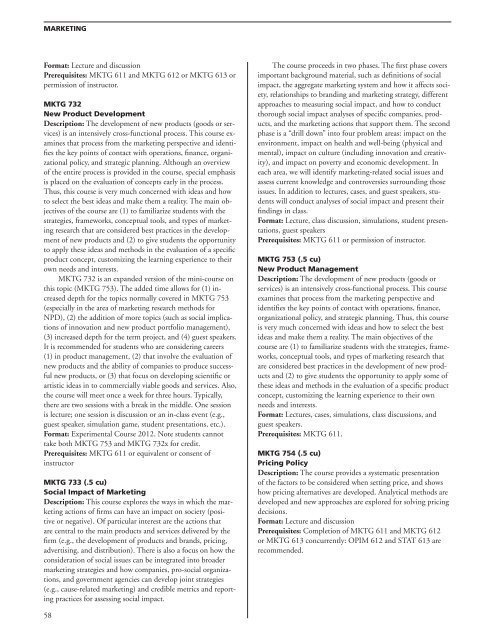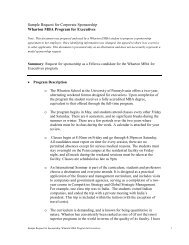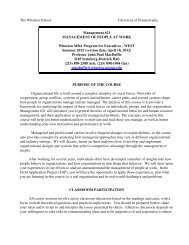Explore Options; Plan Your MBA Academic Program
Explore Options; Plan Your MBA Academic Program
Explore Options; Plan Your MBA Academic Program
You also want an ePaper? Increase the reach of your titles
YUMPU automatically turns print PDFs into web optimized ePapers that Google loves.
MARKETING<br />
Format: Lecture and discussion<br />
Prerequisites: MKTG 611 and MKTG 612 or MKTG 613 or<br />
permission of instructor.<br />
MKTG 732<br />
New Product Development<br />
Description: The development of new products (goods or services)<br />
is an intensively cross-functional process. This course examines<br />
that process from the marketing perspective and identifies<br />
the key points of contact with operations, finance, organizational<br />
policy, and strategic planning. Although an overview<br />
of the entire process is provided in the course, special emphasis<br />
is placed on the evaluation of concepts early in the process.<br />
Thus, this course is very much concerned with ideas and how<br />
to select the best ideas and make them a reality. The main objectives<br />
of the course are (1) to familiarize students with the<br />
strategies, frameworks, conceptual tools, and types of marketing<br />
research that are considered best practices in the development<br />
of new products and (2) to give students the opportunity<br />
to apply these ideas and methods in the evaluation of a specific<br />
product concept, customizing the learning experience to their<br />
own needs and interests.<br />
MKTG 732 is an expanded version of the mini-course on<br />
this topic (MKTG 753). The added time allows for (1) increased<br />
depth for the topics normally covered in MKTG 753<br />
(especially in the area of marketing research methods for<br />
NPD), (2) the addition of more topics (such as social implications<br />
of innovation and new product portfolio management),<br />
(3) increased depth for the term project, and (4) guest speakers.<br />
It is recommended for students who are considering careers<br />
(1) in product management, (2) that involve the evaluation of<br />
new products and the ability of companies to produce successful<br />
new products, or (3) that focus on developing scientific or<br />
artistic ideas in to commercially viable goods and services. Also,<br />
the course will meet once a week for three hours. Typically,<br />
there are two sessions with a break in the middle. One session<br />
is lecture; one session is discussion or an in-class event (e.g.,<br />
guest speaker, simulation game, student presentations, etc.).<br />
Format: Experimental Course 2012. Note students cannot<br />
take both MKTG 753 and MKTG 732x for credit.<br />
Prerequisites: MKTG 611 or equivalent or consent of<br />
instructor<br />
MKTG 733 (.5 cu)<br />
Social Impact of Marketing<br />
Description: This course explores the ways in which the marketing<br />
actions of firms can have an impact on society (positive<br />
or negative). Of particular interest are the actions that<br />
are central to the main products and services delivered by the<br />
firm (e.g., the development of products and brands, pricing,<br />
advertising, and distribution). There is also a focus on how the<br />
consideration of social issues can be integrated into broader<br />
marketing strategies and how companies, pro-social organizations,<br />
and government agencies can develop joint strategies<br />
(e.g., cause-related marketing) and credible metrics and reporting<br />
practices for assessing social impact.<br />
58<br />
The course proceeds in two phases. The first phase covers<br />
important background material, such as definitions of social<br />
impact, the aggregate marketing system and how it affects society,<br />
relationships to branding and marketing strategy, different<br />
approaches to measuring social impact, and how to conduct<br />
thorough social impact analyses of specific companies, products,<br />
and the marketing actions that support them. The second<br />
phase is a “drill down” into four problem areas: impact on the<br />
environment, impact on health and well-being (physical and<br />
mental), impact on culture (including innovation and creativity),<br />
and impact on poverty and economic development. In<br />
each area, we will identify marketing-related social issues and<br />
assess current knowledge and controversies surrounding those<br />
issues. In addition to lectures, cases, and guest speakers, students<br />
will conduct analyses of social impact and present their<br />
findings in class.<br />
Format: Lecture, class discussion, simulations, student presentations,<br />
guest speakers<br />
Prerequisites: MKTG 611 or permission of instructor.<br />
MKTG 753 (.5 cu)<br />
New Product Management<br />
Description: The development of new products (goods or<br />
services) is an intensively cross-functional process. This course<br />
examines that process from the marketing perspective and<br />
identifies the key points of contact with operations, finance,<br />
organizational policy, and strategic planning. Thus, this course<br />
is very much concerned with ideas and how to select the best<br />
ideas and make them a reality. The main objectives of the<br />
course are (1) to familiarize students with the strategies, frameworks,<br />
conceptual tools, and types of marketing research that<br />
are considered best practices in the development of new products<br />
and (2) to give students the opportunity to apply some of<br />
these ideas and methods in the evaluation of a specific product<br />
concept, customizing the learning experience to their own<br />
needs and interests.<br />
Format: Lectures, cases, simulations, class discussions, and<br />
guest speakers.<br />
Prerequisites: MKTG 611.<br />
MKTG 754 (.5 cu)<br />
Pricing Policy<br />
Description: The course provides a systematic presentation<br />
of the factors to be considered when setting price, and shows<br />
how pricing alternatives are developed. Analytical methods are<br />
developed and new approaches are explored for solving pricing<br />
decisions.<br />
Format: Lecture and discussion<br />
Prerequisites: Completion of MKTG 611 and MKTG 612<br />
or MKTG 613 concurrently: OPIM 612 and STAT 613 are<br />
recommended.

















